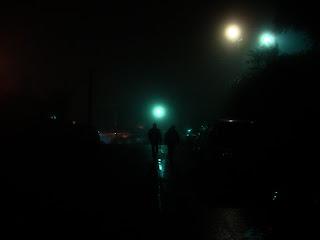 hiking up alishan at 5am for the sunrise, which
hiking up alishan at 5am for the sunrise, whichunfortunately was blocked by fog. all part of a fun trip
over our chinese new year break with some classmates,
where we met up with some taiwanese friends
and some of my classmate's relatives. great times!
A couple of weeks ago, Light posed the fellows the following question:
What perceptions of home have changed for you? Have the qualities you value in home changed as a result of living in a new country, community, and culture?
An interesting and important question indeed, with different levels to discuss: individual, family, community, city, nation, state, and the world. Some questions that I have found myself repeatedly confronted with as an American abroad are: What does it mean to be American? What does it mean to become an American? Is there a timeline or a set of checkpoints that one has to go through? The same questions I suppose apply to becoming that cliché “citizen of the world.” And how does something like the earthquake in Haiti challenge that notion? What level does one identify with when that happens, and how do you act on that? A question that is both harder and easier for diaspora, of which Haiti has a lot. All questions I don’t really have answers to. (a couple of interesting blog posts about the Haitian earthquake as it relates to this at bagnewsnotes: 1 2)
I feel like it’s difficult for me, as well as many of my classmates to have a definite sense of home, as we’re always in-between places it seems. You’re at school for a while, then home for break, then back at school, maybe somewhere else for the next break, home for a bit, and then back to school, etc. While permanence isn’t the most important aspect of home, I think it’s an important part of that feeling of comfort and routine that comes with being “home.” While abroad, however, comfort and routine seem a bit antithetical to the concepts of challenging yourself in that new environment. At the same time, that’s part of the challenge—getting comfortable in the new, strange environment.
It’s been interesting doing that in Taiwan, because it’s been a different set of challenges than the mainland. Not that things are difficult in the mainland, but the challenges one is presented with are often more concrete or straightforward, whereas challenges here have been more subtle and complex, and mostly in terms of culture, and the way people interact. As of late I’ve been a bit more sensitive/aware of the different ways that people make and view friends here, and all of that plays into that sense of comfort. In that way, I feel like Taiwan has been a better challenge in some ways—on a more intellectual/interpersonal level, but maybe I’m just used to it all now too. Knowledge of the language and culture, but also the city, is important too.
That being said, the most important thing is undoubtedly family. When I asked my mom what she thought, she came back with the question: “when we visited you over Christmas, even though we were staying in hotels, did you feel at home?” I could only say yes and no. It was a different kind of comfort and feeling from home, but in some ways it felt more like home than Taipei does for me now. To some degree maybe family, friends, experience and place become entangled in one’s sense of home and the different identities one has in different places. Back in the Qing dynasty, officials sent to Taiwan were not allowed to bring their families with them during their two-to-three year terms, to prevent them from “sprouting roots” in Taiwan—exactly for that reason.
Finding a new home is a difficult thing then, with so many factors coming together to create that sense of “home,” which can only be embodied so far in the house you live in—it’s more about where that house is in relation to the others in your community and the people in the house. When I think of “sprouting roots” I think of a banyan tree slowly dropping more and more roots into the earth as time passes—much like the “tree house” in Anping, Tainan. One must have the right environment and soil to flourish, and may be uprooted many times before finding that, though…. Enough of these silly metaphors.









